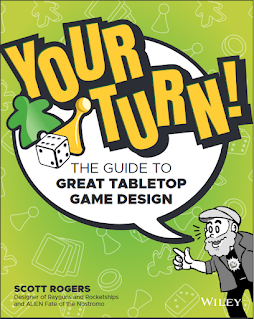Recently on a board game design forum, a first time designer expressed concern that their design didn't have deep enough strategy. As someone who deals with first time designers (in my board game design class) I thought I might be able to help. This is the advice I gave him and I thought others could benefit from it as well:
An exercise I like to give to first time designers is to review all of the actions that the player can do and all
the affordances the components provide.
For example in your game you have:
The 5 different classes of gems
The tiles with 2 different types of gems
The hand of cards
Drawing a card from the deck
The numbers 1-5 on cards
The card attributes - just dirt, +1, -1, mine closed, steal card, etc.
The action of revealing the cards
The action of collecting the gems
You
want to think of all of the things you can do with these components and
actions and what other things the players can do with them. For
example, you could have a tile with 3 types of gems, the gems could have
different values or allow the player to buy certain actions, there
could be a restriction or method to how the cards are drawn (draw 2 and
keep 1 and discard 1 or draw 2 and give 1 to another player, or draw 2
cards and keep 1 and place the other on the top of the deck) or how the
gems are collected - the gems are of limited supply and you can choose
whatever color you'd like or the gems must be taken in a certain order
that causes actions to happen when taken (for example, a cave in) or
that the gems must be thrown into a bag and selected blindly but they
can be stolen or traded between players. As you can see, with just the
elements you have you have lots of options.
So, what is a
designer to do? Which are the best choices? First, I would say use these
choices to make the player play the game you want them to play. What is
the "primary action" of the game? Collecting gems? Playing cards?
Something else? What type of game is it? Blind bidding? Push your luck?
Screw your neighbor? Make EVERYTHING in the game move the player towards
this type of game play. If it conflicts with this, then it probably
shouldn't be in the game.
Also consider another (at least two)
ways for the player to win the game. It might be "get points by
collecting gems" or it might be "play sets of cards and get points for
those" - I like to make games that you can get points during the
gameplay and points at the end of the game. This is often called "points
salad" in Eurogaming and it can get out of control in heavier Euros -
but lightly done, I find it interesting. It obfuscates the answer to
"who is winning this game" until the very end (and you always want to
end with an exciting finish)
Finally, I designed a "make a value
go up or down by making it +1/-1 game" and when I shopped it around, I
was politely told by publishers that they weren't interested in that
type of game. That it was too basic and not engaging and they see a
millions of these types of games. The game now lives on my shelf. I
merely mention this so you might benefit from my own experience.
Friday, October 6, 2017
Subscribe to:
Post Comments (Atom)










No comments:
Post a Comment